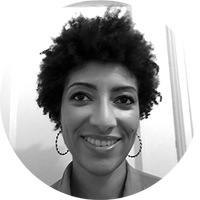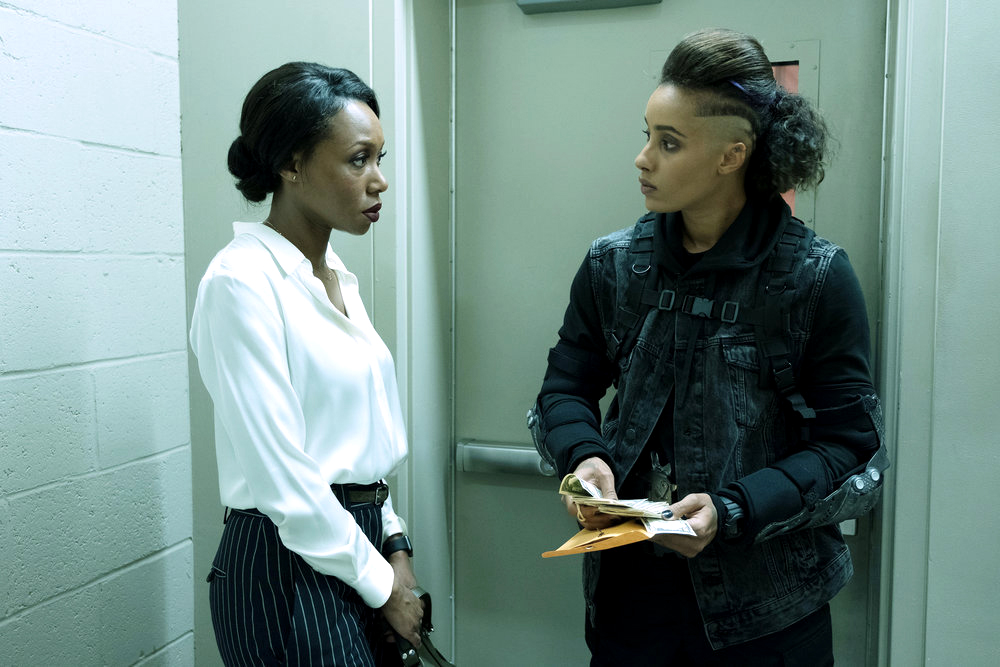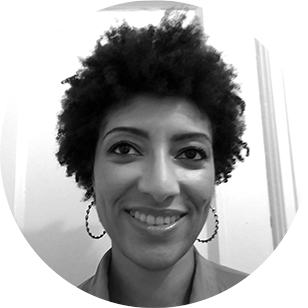How The Purge intricately explores black female rage
By focusing its TV iteration on a professional black woman, The Purge subverts the racial politics it was built upon — to great effect


A free daily email with the biggest news stories of the day – and the best features from TheWeek.com
You are now subscribed
Your newsletter sign-up was successful
Throughout each of its four films, The Purge has made one message very clear: White men in power will do anything to maintain it.
To that end: The government's New Founding Fathers of America (NFFA) party, tired of co-existing with disenfranchised, mostly-minority poor people, has instituted an annual holiday, grossly called Purge Night. The holiday, on which vicious murder is not only legal but encouraged, allows the mostly white men of the NFFA to maintain their lock on power.
The politics of this wildly dystopian universe, which highlight unsettling truths about the way white supremacy enables abusive behavior, have been persistent in each installment: The Purge; The Purge: Anarchy; The Purge: Election Year; and this summer's prequel, The First Purge. We see seemingly upstanding citizens, most of whom are powerful white men or those incentivized by a white government, turn into the most abominable versions of themselves as they terrorize oppressed people of color, triggered by a rage they've been given the right to indulge in. It's become an event complete with horrifying masks, machetes, machine guns, armored trucks, and celebratory gore.
The Week
Escape your echo chamber. Get the facts behind the news, plus analysis from multiple perspectives.

Sign up for The Week's Free Newsletters
From our morning news briefing to a weekly Good News Newsletter, get the best of The Week delivered directly to your inbox.
From our morning news briefing to a weekly Good News Newsletter, get the best of The Week delivered directly to your inbox.
But the eponymous TV adaptation, which premiered Sept. 4, flips that script. Rather than focusing on violence by white citizens, this time around one of the killers is a black woman, whose rage is just as lethal as her white counterparts' — and it's aimed directly at everything they represent.
When we first meet Jane (Amanda Warren) in the pilot episode of The Purge, she seems unsuspecting. She's successful by most standards, with a high-powered corporate job leading a large staff in what she considers one of the "safest" buildings in the city with one of the most expensive and dedicated security teams. She's so confident, in fact, that she chooses to forego a quiet evening at her home on Purge Night to work in the office with her team.
By the second episode, which aired Tuesday night with the title "Take What's Yours," the layers of Jane's backstory are peeled away to reveal a long history of being marginalized at her company. She's constantly having to squirm away from her boss David's (William Baldwin) unwanted sexual advances, and she's been long overlooked for partner. Her talent is clear — even David says so — but the glass ceiling remains as low as ever for her, and she's understandably grown weary. After years of resisting David's persistent flirtation, watching him move on to younger, more eager white women employees willing to do whatever it takes to rise up the ranks hasn't made her experience at the company any more tolerable. She's tired — or, as civil rights heroine Fannie Lou Hamer once said, she's "sick and tired of being sick and tired."
So, this Purge Night, which will span for all of the series' 10 episodes, Jane has decided to take power back by force. Tonight, she plans to pay to have David murdered.
A free daily email with the biggest news stories of the day – and the best features from TheWeek.com
Jane has been harboring resentment for years, but as potentially the only black woman at her company, she can't express even justifiable frustration for fear of being labeled "the angry black woman" — a stereotype so many are forced to confront in the workplace. As a result, she's gone unheard and been left powerless in a corporate structure that was not built for her to succeed in the first place.
That's a lot to suppress for so many years, and the burden has clearly crushed much of Jane's mental and emotional state. It's brought her to the point where she is questioning her own morality and resorting to cold-blooded murder. She is taking control the only way she can, by inserting herself into a bloody political structure where she can for once end up the victor.
But Jane wrestles with her decision up until the time comes for her to hand the money off to her assassin, who's also a woman of color. Does having David murdered make her just as heinous as all the other purgers? Is this really the only way to alleviate the rage that's been building up inside of her for years? Jane contends with these questions aloud as she tries to explain to her hired assassin — whose name is intentionally undisclosed — in their first meeting that this is really her only choice. She starts rattling off longtime grievances at her job, finally daring to vocalize these issues in front of someone who might actually be able to commiserate.
Never mind that the assassin is far from interested — this is a business transaction, after all. For Jane, this is a time for her to validate what she is feeling, and at last give herself the permission to go against every principle she has stood on in order to confront white supremacy in its most anarchic state. Her morals are pushed aside in favor of a much greater, more sinister outcome. Notably, Jane's decision to have David murdered positions her, for the first time ever, on the same level as her white counterparts.
The Purge franchise has always had a knack for deconstructing humans' motivations for violence in an increasingly politically charged society. With this latest offering, the brand has gone a step further, highlighting the power disparity that exists when it comes to race and crystallizing how that can so easily lead to a person who's been sidelined for so long becoming completely unhinged. Through Jane's story, The Purge illuminates how this imbalance directly affects black women — and gives them the authority to finally manifest a rage they've long withheld, in a way that's frighteningly familiar to their white peers.
Candice Frederick is a freelance TV/film critic living in New York City. You can find more of her work here.
-
 How the FCC’s ‘equal time’ rule works
How the FCC’s ‘equal time’ rule worksIn the Spotlight The law is at the heart of the Colbert-CBS conflict
-
 What is the endgame in the DHS shutdown?
What is the endgame in the DHS shutdown?Today’s Big Question Democrats want to rein in ICE’s immigration crackdown
-
 ‘Poor time management isn’t just an inconvenience’
‘Poor time management isn’t just an inconvenience’Instant Opinion Opinion, comment and editorials of the day
-
 Walter Isaacson's 'Elon Musk' can 'scarcely contain its subject'
Walter Isaacson's 'Elon Musk' can 'scarcely contain its subject'The latest biography on the elusive tech mogul is causing a stir among critics
-
 Welcome to the new TheWeek.com!
Welcome to the new TheWeek.com!The Explainer Please allow us to reintroduce ourselves
-
 The Oscars finale was a heartless disaster
The Oscars finale was a heartless disasterThe Explainer A calculated attempt at emotional manipulation goes very wrong
-
 Most awkward awards show ever?
Most awkward awards show ever?The Explainer The best, worst, and most shocking moments from a chaotic Golden Globes
-
 The possible silver lining to the Warner Bros. deal
The possible silver lining to the Warner Bros. dealThe Explainer Could what's terrible for theaters be good for creators?
-
 Jeffrey Wright is the new 'narrator voice'
Jeffrey Wright is the new 'narrator voice'The Explainer Move over, Sam Elliott and Morgan Freeman
-
 This week's literary events are the biggest award shows of 2020
This week's literary events are the biggest award shows of 2020feature So long, Oscar. Hello, Booker.
-
 What She Dies Tomorrow can teach us about our unshakable obsession with mortality
What She Dies Tomorrow can teach us about our unshakable obsession with mortalityThe Explainer This film isn't about the pandemic. But it can help viewers confront their fears about death.
